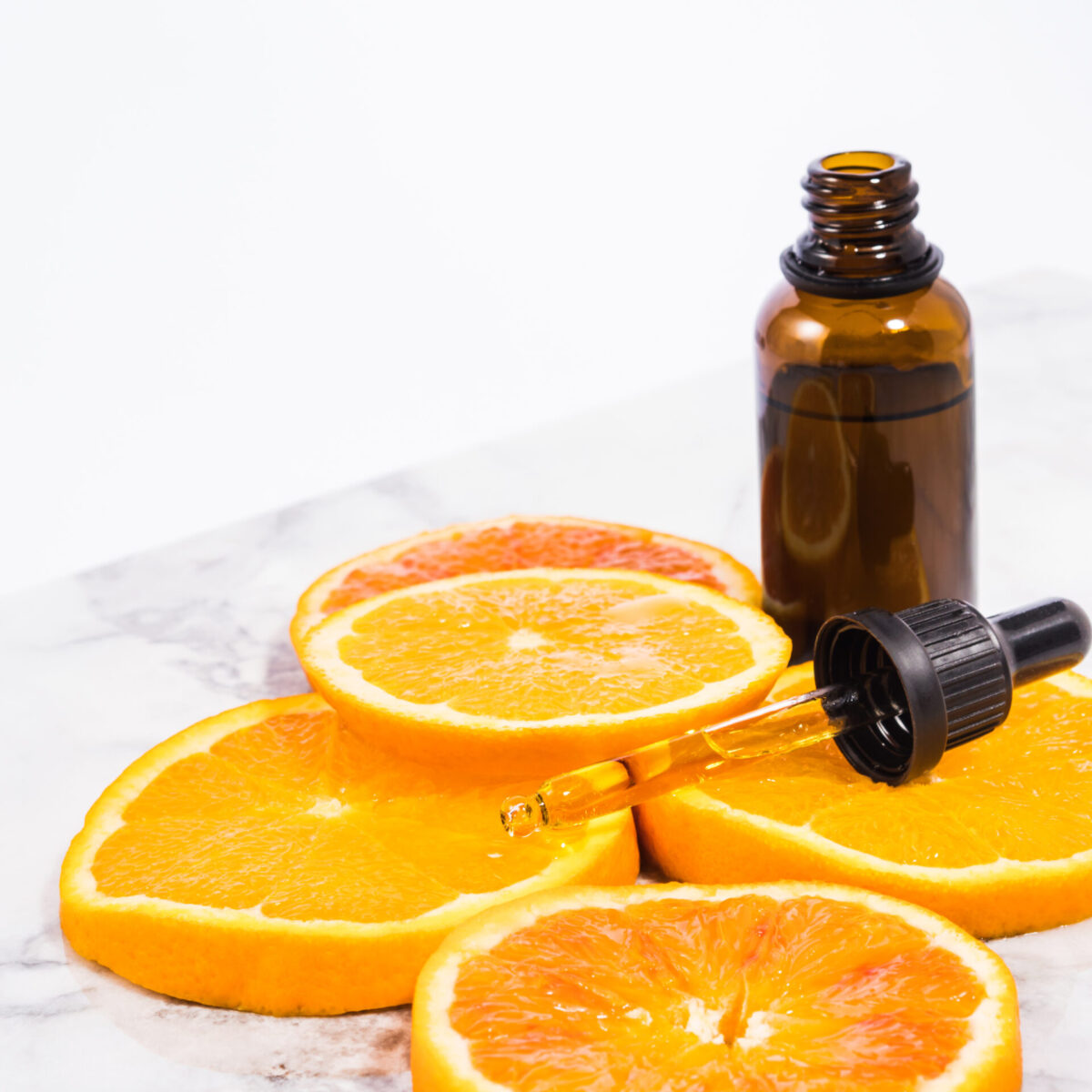
What does vitamin C do for your skin?
We’re happy to be the ones to tell you all about the wonders vitamin C can do for your skin. Vitamin C is an antioxidant. Its biological role as a nutrient is to help grow and repair tissue. It helps to promote collagen production, protect against UV sun damage and free radical damage, and even skin tone. You’ve probably seen it in plenty of brightening products. We can’t produce vitamin C from within the body, so applying it through skincare will help strengthen our skin barrier to prevent damage.
Here’s why we think vitamin C is a skincare staple:
Vitamin C works great with other ingredients.
Vitamin C is particularly effective when combined with other antioxidants such as ferulic acid or vitamin E, which help stabilize the molecules in vitamin C, making it more effective. A great example is Vivier’s C E Peptides Serum for normal to dry skin.
It’s also often paired with hyaluronic acid to be more easily absorbed. The extra hydration will smooth out any fine lines while the vitamin C gets to work. Despite skincare myths, it can also be used with retinol. The journal of the American Academy for Dermatology notes that Vitamin C has a lower pH than retinol. So, you should wait about 30 minutes for your pH to return to normal before layering retinol on top.
Vitamin C can also be applied in the morning or at night, though it’s best to apply in the morning as it better protects your skin against free radical damage. Whichever time of day you choose, consistency is key!
It’s a game-changer for anti-aging.
This article from the International Journal for Chemical Technology Research summarises the pros and cons of vitamin C in cosmeceuticals. According to them, vitamin C stimulates collagen repair, something we lose over time. This helps diminish some of the effects of photodamage, which is responsible for the majority of reasons our skin ages. Combining vitamin C and SPF will leave your skin glowing and protect it in the long term.
It’s great for redness and acne scarring.
Vitamin C isn’t just great for dark spots, it helps to lighten scarring on the skin as well. As a powerful antioxidant, it will reduce redness and irritation. Say goodbye to random pesky red blotches. Because it’s an antioxidant, it doesn’t inherently fight acne though. You’ll need a good AHA or BHA for that, which we’ve talked about here.
You can choose your formula and concentration.
From serums to creams to powders, Vitamin C comes in a lot of different formulas. The most important factors are choosing a concentration that suits your skin tolerance and packaging that won’t spoil the formula with air, heat, or light exposure. The risk with using vitamin C is that maintaining the formula is tricky as it is easily degraded by heat and light. It can also lose its antioxidant properties when exposed to too much oxygen. The solution might become less effective or the molecules unstable. You’ll know if your serum is ‘off’ if it appears very yellow, orange, or brown, or if it develops a new smell.
According to researchers from the Journal of Clinical and Aesthetic Dermatology, reputable vitamin C products range from 10 to 20% in concentration. The effectiveness of the concentration depends on the formula. Generally speaking, a product should have a vitamin C concentration of at least 8% to be biologically significant. Going higher in concentration is more likely to cause irritation than help improve your skin, so always begin with gentle formulas.
Which formulations exist?
Ascorbic acid and L-ascorbic acid
Ascorbic acid is the purest form of vitamin C. It interacts with antioxidants and vitamin E to prevent free radicals from damaging the skin tissue. It will brighten the skin as well and is water-soluble.
Start with a concentration of 8-10% for uneven skin tone, such as the Vivier serum 10. Increase to 15-20% if hyperpigmentation persists. The pH should be formulated at less than 4 for most skin types, but gentler formulations with a pH of 5-7 are great for sensitive skin.
It loses stability very easily. Look for packing that is dark, opaque and air-restrictive. A great example is the vitamin C E complex serum from SkinMedica.
Magnesium and Sodium Ascorbyl Phosphate
These have the same benefits and instructions as ascorbic acid but in a less potent formula. Less irritation and more easily absorbed, and an extra focus on boosting collagen production.
They won’t lose molecular stability as easily as ascorbic acid when exposed to air or sunlight. Look for dark or opaque packaging.
For formulas, sodium ascorbyl phosphate is more highly concentrated in serums than in cream. Magnesium ascorbyl phosphate should always be used in a water-based formula, and pairs very well with niacinamide. Both forms are most stable at a pH of 7.
For Sensitive Skin Types: Ascorbyl Palmitate, Calcium Ascorbate, Ascorbyl Glucoside
These are derivatives of vitamin c, so they are much milder forms compared to ascorbic acid. They accommodate sensitive skin. Calcium ascorbate works best at a neutral pH so it’s gentle and non-irritating. Ascorbyl glucoside converts itself into ascorbic acid once on the skin, so it’s highly stable.
Starting out with vitamin C can be intimidating. There are a lot of options to choose from. If you stick with a concentration of about 10%, you really can’t go wrong. Just ensure to choose more gentle forms of vitamin C if your skin needs it. Don’t be afraid of trial and error, and always remember to layer on SPF during the day!



